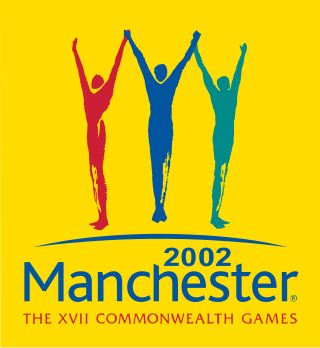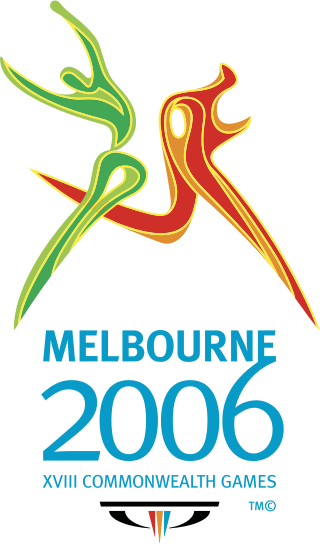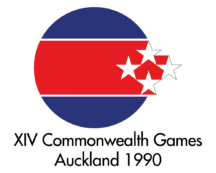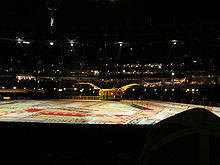
The Commonwealth Games is a quadrennial international multi-sport event among athletes from the Commonwealth of Nations, which consists mostly, but not exclusively, of territories of the former British Empire. The event was first held in 1930 as the British Empire Games and, with the exception of 1942 and 1946, has successively run every four years since. The event was called the British Empire Games from 1930 to 1950, the British Empire and Commonwealth Games from 1954 to 1966, and the British Commonwealth Games from 1970 to 1974. The event removed the word British from its title for the 1978 Games and has maintained its current name ever since.

The 2002 Commonwealth Games, officially known as the XVII Commonwealth Games and commonly known as Manchester 2002, was an international multi-sport event for the members of the Commonwealth held in Manchester, England, from 25 July to 4 August 2002. According to planning, this event was to be held in a country in the United Kingdom as part of the Golden Jubilee of Elizabeth II, head of the Commonwealth. England was the only bidder for the event and, in an internal process, Manchester was selected for the 2002 Games ahead of London. The Manchester bid used projects which were part of the failed bid for the 2000 Summer Olympics and Paralympics, which were awarded to Sydney, Australia. The 2002 Commonwealth Games was, prior to the 2012 Summer Olympics, the largest multi-sport event ever to be held in the UK, eclipsing the London 1948 Summer Olympics in terms of teams and athletes participating. The 2002 Commonwealth Games had the largest number of events of any Commonwealth Games in history, featuring 281 events across 17 sports.

Marjorie Jackson-Nelson is an Australian former athlete and politician. She was the Governor of South Australia between 2001 and 2007. She finished her sporting career with two Olympic and seven Commonwealth Games Gold Medals, six individual world records and every Australian state and national title she contested from 1950 to 1954.

The 2006 Commonwealth Games, officially the XVIII Commonwealth Games and commonly known as Melbourne 2006, were an international multi-sport event for members of the Commonwealth held in Melbourne, Australia between 15 and 26 March 2006. It was the fourth time Australia had hosted the Commonwealth Games. It was also the largest sporting event to be staged in Melbourne, eclipsing the 1956 Summer Olympics in terms of the number of teams competing, athletes competing, and events being held.

The 1998 Commonwealth Games, officially known as the XVI Commonwealth Games, was a multi-sport event held in Kuala Lumpur, Malaysia. The 1998 games were the first held in Asia and the last Commonwealth Games of the 20th century. For the first time ever, the games included team sports. The other bid from the 1998 games came from Adelaide in Australia. Malaysia was the eighth nation to host the Commonwealth Games after Canada, England, Australia, New Zealand, Wales, Jamaica and Scotland. Around 3638 athletes from 70 Commonwealth member nations participated at the games which featured 214 events in 15 sports with 34 of them collected medals.
The opening ceremony of the 2004 Summer Olympics was held on August 13, 2004 starting at 20:45 EEST (UTC+3) at the Olympic Stadium in Marousi, Greece, a suburb of Athens. As mandated by the Olympic Charter, the proceedings combined the formal and ceremonial opening of this international sporting event, including welcoming speeches, hoisting of the flags and the parade of athletes, with an artistic spectacle to showcase the host nation's culture and history. 72,000 spectators attended the event, with approximately 15,000 athletes from 202 countries participating in the ceremony as well. It marked the first-ever international broadcast of high-definition television, undertaken by the U.S. broadcaster NBC and the Japanese broadcaster NHK. The Games were officially opened by President of the Hellenic Republic Konstantinos Stephanopoulos at 23:46 EEST (UTC+3).

The 1990 Commonwealth Games was held in Auckland, New Zealand from 24 January – 3 February 1990. It was the 14th Commonwealth Games, and part of New Zealand's 1990 sesquicentennial celebrations. Participants competed in ten sports: athletics, aquatics, badminton, boxing, cycling, gymnastics, judo, lawn bowls, shooting and weightlifting. Netball and the Triathlon were demonstration events.

The 1974 British Commonwealth Games was held in Christchurch, New Zealand from 24 January to 2 February 1974. The bid vote was held in Edinburgh at the 1970 British Commonwealth Games. The event was officially named "the friendly games". There were 1,276 competitors and 372 officials, according to the official history, and public attendance was excellent. The main venue was the QEII Park, purpose-built for this event. The Athletics Stadium and fully covered Olympic standard pool, diving tank, and practice pools were all on the one site. The theme song was "Join Together", sung by Steve Allen. The event was held after the 1974 Commonwealth Paraplegic Games in Dunedin for wheelchair athletes.

The Opening Ceremony of the 2006 Winter Olympics was held on 10 February 2006 beginning at 20:00 CET (UTC+1) at the Stadio Olimpico in Turin, Italy.
The Opening Ceremony of the 1982 Commonwealth Games was held on 30 September 1982 at the QEII Stadium in Brisbane, Queensland, Australia.
The Closing Ceremony of the 2006 Commonwealth Games was held at the Melbourne Cricket Ground in Melbourne, Victoria, Australia on 26 March 2006.

The opening ceremony of the 2000 Summer Olympics took place on the evening of Friday, 15 September 2000 in Stadium Australia, Sydney, during which the Games were formally opened by then-Governor-General Sir William Deane. As mandated by the Olympic Charter, the proceedings combined the formal and ceremonial opening of this international sporting event, including welcoming speeches, hoisting of the flags and the parade of athletes, with an artistic spectacle to showcase the host nation's culture and history. Veteran ceremonies director Ric Birch was the Director of Ceremonies while David Atkins was the Artistic Director and Producer. Its artistic section highlighted several aspects of Australian culture and history, showing Australia's flora and fauna, technology, multiculturalism, and the hopeful moment of reconciliation towards Aboriginal Australians. The ceremony had a cast of 12,687 performers, seen by a stadium audience of around 110,000.

Commonwealth Games: Melbourne 2006 Opening Ceremony, 2006 Commonwealth Games Opening Ceremony or Melbourne 2006, XVIII Commonwealth Games: Official Music from the Opening Ceremony, features music by Various Artists from the 2006 Commonwealth Games opening ceremony. The ceremony took place on 15 March 2006 at the Melbourne Cricket Ground and the live album was released by Sony BMG Music Entertainment Australia on 19 March 2006. Performers included Melbourne Symphony Orchestra, the Church, the Cat Empire, Ursula Yovich and Delta Goodrem. The score was written by Christopher Gordon, and was commissioned by the Melbourne 2006 Commonwealth Games Committee. The performance was partly funded by the Australian Government's Department of Communications, Information Technology and the Arts.

The 2018 Commonwealth Games, officially known as the XXI Commonwealth Games and also known as Gold Coast 2018, were an international multi-sport event for members of the Commonwealth that was held on the Gold Coast, Queensland, Australia, between 4 and 15 April 2018. It was the fifth time Australia had hosted the Commonwealth Games and the first time a major multi-sport had an equal number of events for male and female athletes.

The 2008 Summer Olympics closing ceremony was held at the Beijing National Stadium, also known as the Bird's Nest. It was directed by Chinese filmmaker Zhang Yimou and began at 20:00 China Standard Time (UTC+8) on Sunday night, 24 August 2008. The number 8 is associated with prosperity and confidence in Chinese culture.

David Zolkwer is a producer and director of international public events, theatre, ceremonies, celebrations, festivals and immersive corporate experiences. His work has been witnessed live by millions and on television by billions.

The opening ceremony of the 2010 Commonwealth Games was held at the Jawaharlal Nehru Stadium, the main stadium of the event, in New Delhi, India. It began at 7:00 PM (IST) on 3 October 2010 ending at 10:00 PM (IST) displaying India's varied culture in a plethora of cultural showcases. Wizcraft was given the contract to produce the opening and closing ceremonies of the 2010 Commonwealth Games.

The 2000 Summer Olympics Closing Ceremony was held on 1 October 2000 in Stadium Australia. As with the opening ceremony, the closing ceremony was directed by Ric Birch as Director of Ceremonies while David Atkins was the Artistic Director and Producer. The Closing Ceremony was attended by 114,714 people, the largest attendance in modern Olympic Games history. The ceremony celebrated Australiana; Australian cultural celebrities, icons, media, and music, with floats designed in the style of Reg Mombassa. Around 2.4 billion watched the telecast of the closing ceremony.

The opening ceremony for the 2014 Commonwealth Games was held at Celtic Park in Glasgow, Scotland, between 21:00 and 23:40 BST, on 23 July 2014.

The opening ceremony for the 2018 Commonwealth Games took place on the evening of Wednesday 4 April in the Carrara Stadium, Gold Coast. As mandated by the Commonwealth Games Charter, the proceedings of the ceremony combined the formal opening of the sporting event with an artistic performance to showcase the host nation's culture. The 2018 Games were formally opened by Charles, Prince of Wales. Jack Morton Worldwide was given the contract to produce the opening and closing ceremonies of the 2018 Commonwealth Games. The theme of the opening ceremony was Hello Earth and directed by David Zolkwer.




















